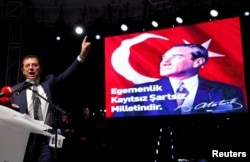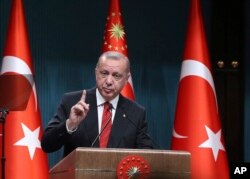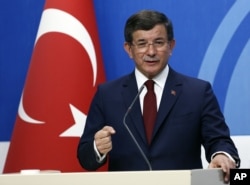Turkey is set for a revote in the aftermath of the hotly contested mayoral elections in Istanbul.
The country's Supreme Electoral Council (YSK) upheld President Recep Tayyip Erdogan's Justice and Development Party's (AKP) petition to annul the March 31 result, which ended the AKP's 25 years of rule.
A revote threatens to plunge the country into political and economic chaos.
Turkey's state news agency reported the new vote would be held June 23. The YSK has not published the reasons for its decision. However, the 11 judges voted 7-to-4 to annul the local Istanbul vote.
"We are thirsty for democracy. We are young. No one can stop what the people want. We will never give up," Ekrem Imamoglu, winner of the Istanbul mayoral election, declared at a rally in response to his victory being annulled.
Thousands of Imamoglu's supporters protested through the night in the streets of Istanbul, while others banged pots and pans to signal their anger.
The AKP claims voting irregularities marred the April 1 vote and welcomed the YSK decision.
"The High Election Council has not ruled for a winner. They have only ruled for the people to present their will under fair, indisputable conditions," said AKP vice chair Cevdet Yılmaz.
The ruling party claims many voting officials were uncertified or ineligible.
Strong reaction
The opposition pro-Kurdish HDP reacted angrily to the YSK.
"May 6, 2019 — once again there is a coup in Turkey," said journalist Ahmet Sik, who is also a Peoples' Democratic Party (HDP) member of parliament.
There is also a strong international reaction to the revote decision.
"Erdogan does not accept defeat and goes against the will of the people," said Kati Piri, European parliamentarian and the EU's Turkey rapporteur. "AKP pressured YSK to re-run local elections in Istanbul. This ends the credibility of democratic transition of power through elections in Turkey."
The Republican People's Party's (CHP) leadership did not immediately react to the YSK's decision, with the party holding an emergency meeting. There are reports that prominent members of the opposition party are calling for a boycott of a future vote.
For several years, there has been a simmering debate within the opposition over whether to continue participating in elections that were considered unfair.
'He who controls Istanbul, controls Turkey'
Imamoglu's narrow victory sent political shock waves across the country. Some analysts claim the magnitude of the triumph changed the political landscape and restored belief that the opposition could successfully challenge Erdogan.
Erdogan's hometown of Istanbul was his electoral fortress. His AKP, and the party's Islamist predecessors, held the city for 25 years.
Since its defeat, the AKP repeatedly challenged the election results with exhaustive partial recounts. But those efforts failed to overturn Imamoglu's victory and only reduced his winning margin to 14,000 votes.
Istanbul is home to about a quarter of Turkey's population and accounts for a third of the country's production and wealth.
Erdogan campaigned intensely and held as many as eight rallies a day, declaring, "He who controls Istanbul, controls Turkey."
Economic repercussions
The decision to contest the vote is deeply contentious, causing rare public divisions within the usually disciplined AKP. With Turkey mired in recession, near-record unemployment and food inflation over 30%, analysts say there is concern that a new election could inflict further economic pain.
The Turkish lira fell sharply on the news of a revote. The lira is already one of the world's worst performing currency, falling more than 14% since the start of the year.
Analysts warn that Erdogan is taking a risk going back to the electorate.
"A second defeat would shatter Erdogan's armor of invincibility, rendering him vulnerable to attacks by the aforementioned intra-party rebels," said Atilla Yesilada of Global Source Partners. "The president is probably paying too dear a price to keep Istanbul, which he may end up losing again."
International investors are reportedly alarmed at the prospect that Erdogan will use all economic means to avoid defeat in the June poll — a move that could further weaken the currency.
Last month, Erdogan's former prime minister Ahmet Davutoglu issued a scathing statement condemning his party's economic and political handling of the country.
Davutoglu's statement is stoking speculation of a split within the AKP. Erdogan's decision to seek a revote is already predicted to have far-reaching consequences.
"Even before Erdogan made up his mind on Istanbul, a split or rebellion in the AKP commanded very high odds. Now, whether AKP wins or loses, it is well-nigh inevitable," Yesilada said.







